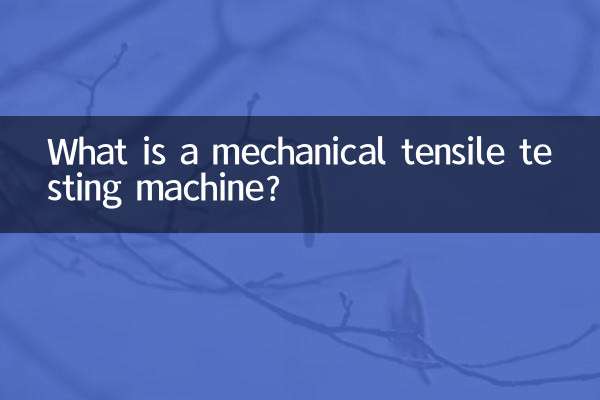What is a mechanical impact testing machine?
In the fields of industrial production and scientific research, mechanical impact testing machines are an important testing equipment used to simulate the impact of products during transportation, use or extreme environments to evaluate their impact resistance and reliability. This article will introduce in detail the definition, working principle, application fields and technical parameters of the mechanical impact testing machine to help readers fully understand this equipment.
1. Definition of mechanical impact testing machine

A mechanical impact testing machine is a device that generates impact force mechanically and is used to test the performance of materials or products under instantaneous impact loads. It is widely used in automotive, electronics, aerospace, packaging and other industries and is an indispensable tool in quality control and product development.
2. Working principle of mechanical impact testing machine
The mechanical impact testing machine completes the test through the following steps:
1.energy storage: Store energy through springs, weights, or other mechanical structures.
2.energy release: Instantly releases stored energy to generate impact.
3.Impact transfer:Transmit the impact force to the sample under test.
4.data logging: The sensor records acceleration, displacement and other parameters during the impact process.
3. Application fields of mechanical impact testing machine
Mechanical impact testing machines play an important role in multiple industries. The following are its main application areas:
| Industry | Application scenarios |
|---|---|
| car | Testing the impact resistance of vehicle components |
| electronic | Evaluate the reliability of electronic products in a drop or crash |
| Aerospace | Simulate the impact environment of aircraft during takeoff and landing |
| packaging | Test the protective ability of packaging materials during transportation |
4. Technical parameters of mechanical impact testing machine
The following are the typical technical parameters of mechanical impact testing machines:
| parameters | Description |
|---|---|
| impact energy | Usually 10J-1000J, selected according to test requirements |
| Impact speed | 1m/s-10m/s, adjustable |
| Maximum load | 50kg-500kg, depending on equipment model |
| Test frequency | Single or multiple impacts, frequency adjustable |
| Data collection | Supports recording of acceleration, displacement, force and other parameters |
5. Advantages of mechanical impact testing machine
Compared with other types of impact testing machines, mechanical impact testing machines have the following advantages:
1.Simple structure: The mechanical structure is stable and the maintenance cost is low.
2.Easy to operate: No complicated control system required, easy to use.
3.lower cost: Compared with hydraulic or electric impact testing machines, the price is more competitive.
4.High reliability: Suitable for long-term and high-frequency testing.
6. How to choose a mechanical impact testing machine
When selecting a mechanical impact testing machine, the following factors need to be considered:
1.Testing requirements: Determine equipment specifications based on sample size, weight and testing standards.
2.Accuracy requirements: High-precision testing requires the selection of more advanced equipment with sensors and data acquisition systems.
3.budget: On the premise of meeting the testing needs, choose cost-effective equipment.
4.After-sales service: Choose a supplier with complete after-sales service to ensure long-term stable operation of the equipment.
7. Future development trends of mechanical impact testing machines
With the advancement of science and technology, mechanical impact testing machines are also constantly upgraded, and the following trends may appear in the future:
1.Intelligent: Integrate more sensors and data analysis functions to achieve automated testing.
2.Modular: The equipment structure is more flexible, making it easy to adjust the test mode according to needs.
3.Environmental protection: Reduce energy consumption and noise, complying with the requirements of green manufacturing.
Through the above introduction, I believe readers will have a deeper understanding of mechanical impact testing machines. Whether it is product quality control or scientific research experiments, mechanical impact testing machines play an irreplaceable role.

check the details

check the details